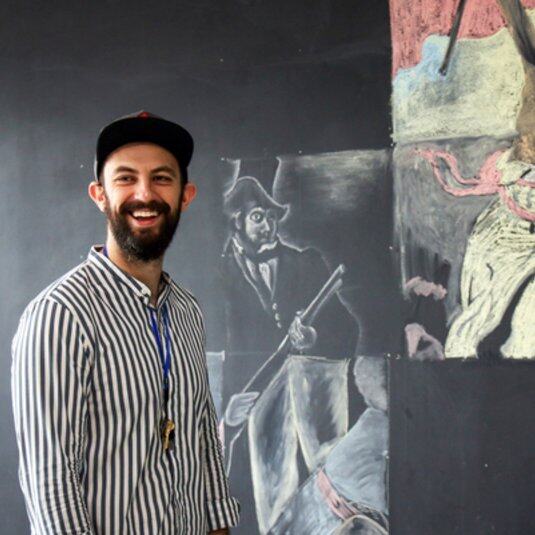Jare Bruhn is the assistant professor at Mason Korea who teaches Computer Game Design. Learn how the game industry is growing and why students should choose to study the major here at the Korea campus.


- Could you explain what students study for Computer Game Design major?
Mason Korea’s Computer Game Design major is a broad program that covers all of the major facets of game development. Lower level classes cover everything from introductory programming, both digital and board game design, developing 2D and 3D art skills, and manipulating audio to create the sound of a game. As students progress, they’ll have more opportunities to hone their skills in a particular interest, both through elective courses and a larger emphasis on group projects that let students fill a particular role in a team.
- Why is CGD major promising these days?
Currently, the game industry generates about 4x as much revenue as film and 8x more than music. Audiences for games have grown substantially with the evolution of smartphones, and that audience is diversifying with women making up 45% of players. Third-party game creation tools and digital game markets make it easier than ever to create games and distribute them. Game designers are still discovering the potential for virtual and augmented reality to create unique interactive experiences. CGD is a rare major that students can choose both because of the opportunities it presents and a desire to pursue a creative field.
- What is the trend of gaming industry based on what you teach?
The gaming industry has come a long way in the last decade. For one, many more games are being created for applications other than entertainment. Games are being introduced into classrooms for educational purposes, businesses are using games to train their employees, designers are bringing awareness to social issues by simulating complicated systems in playable media, and as people are required to practice social distancing, fitness games have fulfilled a need for players to exercise from home. GMU has been at the forefront of these opportunities, and our Fairfax campus created the Virginia Serious Games Institute in 2013 to support start-ups creating games with goals other than entertainment.
- How do you view Korean market in this field?
South Korea has a very interesting history that has informed what kinds of games have found success here, and the popularity of PC Bangs and competitive gaming is still felt today. South Korea remains a leader in e-sports, and fourth in global game industry revenue, with Seoul ranked #11 for game development hotbed cities according to GameIndustryCareerGuide.com (https://www.gameindustrycareerguide.com/best-cities-for-video-game-development-jobs/)
- What is the advantage for students studying CGD in Korea?
Success as a game developer has a lot to do with networking. South Korea holds some of the largest game communities around the world, and students who know both Korean and English have an advantage that they can communicate with more game developers to create partnerships. Seoul is a game development hotbed city, and events in Seoul and Busan make it easier to create these types of connections. Mason Korea students also have the opportunity to make global connections during their studies in the Fairfax campus.



































